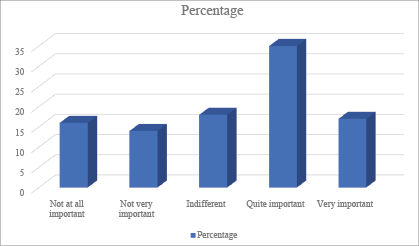doxa.comunicación | nº 31, pp. 41-61 | 55
July-December of 2020
María Soler-Campillo, Esteban Galán-Cubillo and Javier Marzal-Felici
ISSN: 1696-019X / e-ISSN: 2386-3978
Graph 6. Responses of interviewees in the 2019 survey regarding the creation of the Valencian Audio-Visual Academy
Created by the authors
As can be seen in the graph, more than 52% of the respondents consider the appearance of AVAV to have been quite or very important. From the initial 60 members of the AVAV, the academy has grown to 145 associates in just over a year and a half, which indicates a collective will to create a large platform that brings together the interests of the audio-visual sector, even though this organisation has no room for the information and advertising professionals who have participated in the questionnaires in this study.
5. Discussion and conclusions
On the one hand, analysis of the responses from the surveys of 2015 and 2017 shows that the news coverage of the RTVV closure, and even its repercussions at the international level due to denouncements before the United Nations and the European Parliament, have been perceived by communication professionals in a rather negative way, as it has become a politicised issue in which the economic interests of private media have interfered. This indicates that many journalists do not understand the role played by the public media in a modern media system. Nevertheless, one fifth of the respondents were unaware of the existence of the international allegations. The results of these surveys confirm that in the news coverage of the RTVV closure there has been a clear lack of impartiality and rigour in much of the press, as can be seen in a critical analysis of the news published during that period (Marzal-Felici & Soler-Campillo, 2017).
With regard to the question of reputation, the results of this work reflect the need for communication professionals to improve the image they have of their own professional group.
